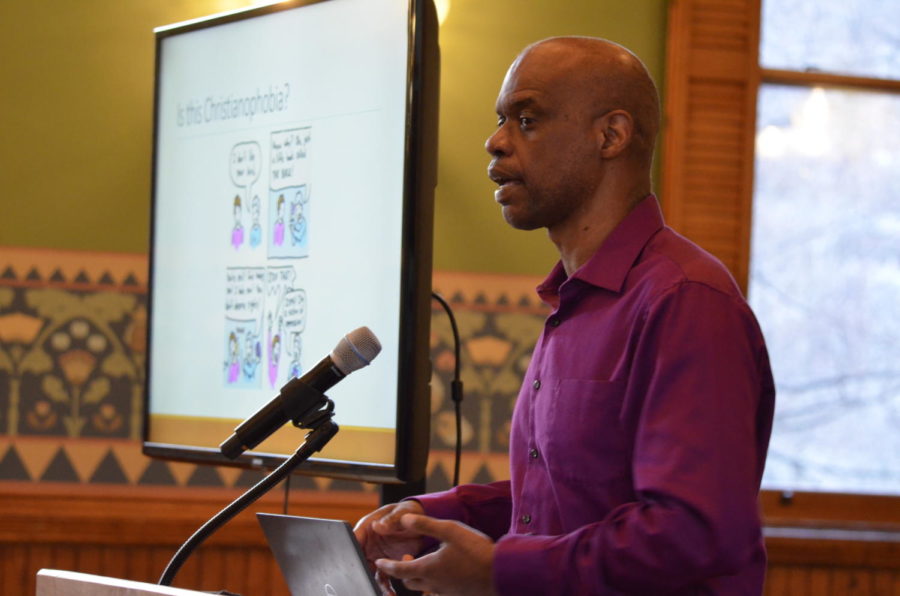Sociologist talks about nationwide anti-Christian bias
March 31, 2023
An edit was made to this article on 04/10 to fact check a stated claim.
Sociologist George Yancey of Baylor University addressed his research on anti-Christian bias within the global west as well as tension between it and the “free exercise” tradition of the U.S. Constitution on Tuesday, March 28.
Yancey’s talk is part of the “Culture and the Constitution” series hosted by the Bucknell Program for American Leadership, a Bucknell faculty association sponsored by Bucknell alumni in the Open Discourse Coalition.
The Open Discourse Coalition claims to support Bucknell values, encouraging “different cultures and diverse perspectives.” Yancey was introduced by two of Bucknell’s faculty members, Paul Siewers and Joe Murray.
Yancey began his talk with a visual cartoon titled, “Is this Christianophobia?” It ignited his overall discussion on the unfair portrayal of Christians in society as unloved and dangerous.
After his cartoon, Yancey referenced various parts of his research, such as his fascination on how fundamentalists are one of the least favored groups in society, touching just above socialists. He also delved deep into the income, gender, educational and political gap towards liking Christians and how the extreme polarization may be a cause of Christianophobia.
Yancey’s research demonstrates that Christianophobia tends to be garnered from those who have “cultural power,” denoting Christians as those who do not have “cultural power.”
Those who are attracted to the arts, come from higher middle class backgrounds and have secular beliefs target Christians and spread bias throughout the majority of the nation.
With that, Yancey stated various studies, including his own research, that went into the harsh realities that Christians have to face in the workforce. The political and religious bias makes it far more likely for fundamentalists and evangelicals to be dismissed in the hiring process, before they even get an interview.
He then went into the overarching question spawning from these facts: Who is to blame? Yancey stated that the media is largely the scapegoat. With the “unjust” documentation of violence and hate speech towards Christians, and as a result, Christianophobia is spread through televisions and newspapers at a rate faster than ever before.
Yancey then asked the audience the main question of the latter half of the forum: “What do Christians Want?”
A survey indicated that many wanted no change in laws to protect Christian beliefs, to which many said that there should be laws, especially when it comes to homeschooling, more punishment on Christian hate crimes and tax subsidies on churches.
The survey also concluded that Christians should keep their Christianity in their homes and their church and not bring it outside those places in order for a functional society.
Yancey then jumped into another perception regarding this conversation: its legal merit. He explained various religious tests that senators put on bureaucrats, justices and judges and analyzed a plethora of Supreme Court and lower court cases that were extremely important in defining the free exercise of Christianity in the United States today.
To conclude, Yancey partook in a brief Q&A, where he discussed his future research endeavors, political bias and its impact on Christianophobia, how Christian students should act in an environment that might not accept them, the timeline of Christian tolerance and how colleges should bring together those who are primarily faith-based.






















